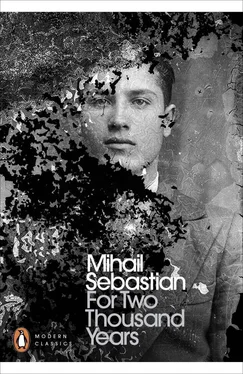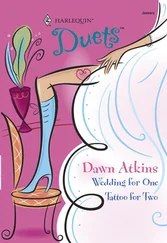‘Stop!’
The driver braked hard, jolting us yet again.
‘We’ve arrived,’ he tells me and points to an imaginary line ahead, past which you could only see the points of three bayonets.
‘Jilava Prison?’
‘Yes. It’s underground.’
The ringing of the bell, the repeated shouts of the sentries (‘Changing of the guard!’ … ‘Changing of the guard!’ …), the document checks, the suspicious looks from the officer on duty, are all simple, bearable. The only dark and oppressive thing, my old friend S.T. Haim, is this small wooden door at the end of a stone alley, this threshold I will, within minutes — seconds — cross. From here on I am powerless to avert my gaze. From beyond, strange, distant footsteps can be heard, as if from another world. There, the door is opening. I have to come up with a smile. At all costs, I must find it in me to smile.
Blessed S.T.H.! He appeared in the doorway as stormily as ever, blond, agitated, impatient, his whole face illuminated. He stopped there for a moment to seek me out from twenty metres, from the other side of the bars. How many steps does he take to reach me? One, I think.
He talks quickly, hastily, with animation, with eyes and hands, with the lock of hair that always flops over his forehead, with his whole being, as though under fierce internal pressure, exulting now with the joy of release.
‘If you could know how great it is here! People, the first people I’ve met. Centuries of prison are behind the door, no? Thousands of years. And it’s still not enough, because these people can take it without complaint. I would’ve been ashamed to feel sorry for myself, for my twelve-year sentence. If it weren’t for the lawyers and Mother, I wouldn’t even have appealed. Because this is where I’ll end up in any case. For us in here, there’s no review board, no appeal. I don’t delude myself with that nonsense. But the biggest appeal of all is coming — and coming soon, you might as well know. I don’t know what it’ll be like on Calea Victoriei, but here in the cells there’s a great smell of revolution. Don’t laugh. I can feel it. It’s a definite, physical feeling. There’s not a night I don’t fall asleep thinking that in the morning we could find the doors swinging open. We could be out before the first snowfall.’
His absurd confidence astounds me. No, I’m not going to grab his shoulder and shake him awake. What good would that do? It’s better if he believes and waits, even if he’s only waiting for a pathetic shadow, a chimera he has taken with him on his journey into a land guarded by machine-guns and rifles.
Farewell, S.T.H. Ten minutes have passed, and Jilava’s clock is more exact than the clock of history. Jilava measures minutes and seconds, you count out decades and centuries.
*
I dropped into the Central, where I was sure to find Ştefan Pârlea. He doesn’t move from here from dawn until after midnight. He has a table at the back, on the right, beside the bar, which everyone recognizes as his domain. It’s been a long time since he’s been at the ministry. He resigned in order to be free. Free to do what? I don’t know. Free for ‘the new dawn’. I’d have liked to tell him that his new nihilist hangout — unkempt and tatty — is ridiculous. But I was afraid he might explode with his old cry: ‘Shut up! You’re an aesthete!’
I’d gladly avoid him, but he’s the only person who can really tell me what’s going on with S.T.H., why he was arrested, why he was convicted and what his prospects are. His file contains a German police report, which identified him in Berlin three months before his arrest, speaking at a neighbourhood communist meeting. There’s also the evidence of a senior functionary, who heard him speaking loudly on the Orient Express about ‘important secrets about arms’. In addition, depositions, allusions, presuppositions. The whole thing is flimsy and insubstantial. What’s true, though, is that it concerns S.T. Haim, an eager revolutionary any day of the week. It would have been no surprise had he been caught with nitro-glycerine in the pocket of his waistcoat. The man is as capable of carrying a bomb as an umbrella and of calmly depositing it at a cloakroom: ‘Please, put this bomb under my number; though mind it doesn’t go off.’
Pârlea finds my questions irritating.
‘Why did they arrest him? Why did they convict him? Blather and nonsense. They arrested him because they had to. Him yesterday, me today, tomorrow everybody. That’s the only way you can have a revolution: with everyone sent to jail. Is he guilty? Innocent? He gets five years? Fifty-five years? His problem. For us, there’s only one question: is the state at the point of collapse or is it not?’
‘I hadn’t taken you for a communist.’
‘And I’m not one. What does that mean? Communist, reactionary, left, right … Superstitions, man, half-baked ideas. There’s only an old world and a new one. That’s all. A world that’s at breaking point and one that’s being born. Am I supposed to sit here lamenting S.T. Haim? I’ve no time. Full stop. We’re all stumbling through the night, pell-mell, some falling, others not, each to his fate. When morning comes, we’ll see who’s still standing.’
Not even here in the café, between two drained glasses of beer, dominating all the tables around with his baritone voice and scaring his timid young listeners, is Mr Ştefan D. Pârlea ridiculous. He has an inspired visage and a firm fist. When he speaks, his gaze moves about the surrounding faces, as though seeking a target. A group of adolescents flanks him like a permanent guard, all awkward in their civilian clothing, their first since leaving school. They smoke a lot and badly, sometimes with too great a show of bravura, sometimes with a nervous twitch that betrays the recent memory of furtively lighting up in water closets. Various pamphlets circulate among them, and they read them avidly, commenting aloud, reciting verses, proclamations, manifestos. They all speak with exaggerated familiarity although they’ve never shaken hands, and never met each other before. Between one and two o’clock, the hubbub suddenly ceases. Everybody is looking for the 26 lei needed for the lunchtime special. Coins pass from table to table, coughed up either amicably or with a bit of swearing. The girls are fewer in number, the occasional one lost amidst a group of boys, jaded waifs in trenchcoats, bareheaded, stubbing out half-smoked cigarettes. It’s hard to know what they are: perhaps students, perhaps cabaret dancers, perhaps just streetwalkers.
Then there’s one who looks surprisingly like Louise Brooks, in Lulu . All the boys address her by name — Vally — and she responds to them all with the same sweet, bored smile. She wears a green sweater pulled in boyishly at the waist by a belt and on her head a scrap of a beret — also green — that leaves her three-quarters bare head rounded off with a fringe. She visited our table and greeted Pârlea with a vague gesture, raising her index finger to tip the brim of an imaginary hat.
‘Got a smoke?’ she asked me in passing, and I proffered my pack of Regalas. She took one, frowning for some reason.
‘You look like the heroine in Wedekind.’
‘I know. Lulu.’
‘How do you know?’
‘It’s what they tell me.’
She went away, her gait more casual and indifferent than lazy.
I’ve discovered why Vally turned up her nose while accepting my cigarette. At the Central they only smoke ‘workingman’s’ cigarettes, cheap cigarettes made with black tobacco. Mine was a bourgeois cigarette. Poets, revolutionaries, free people, those with imagination, visionaries, only smoke proletarian tobacco. My poor 30 lei pack was bad manners, an affront. The frown of the girl who looks like Lulu in Wedekind meant: ‘So that’s the kind you are.’
Читать дальше












